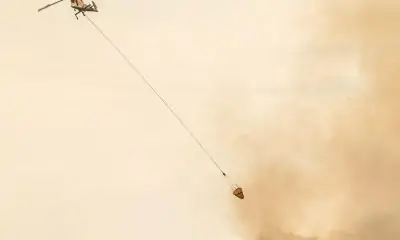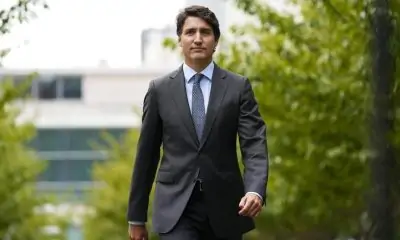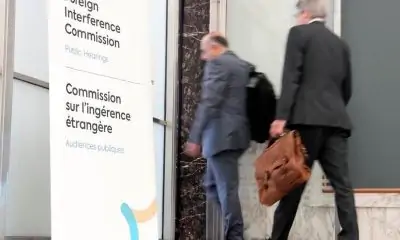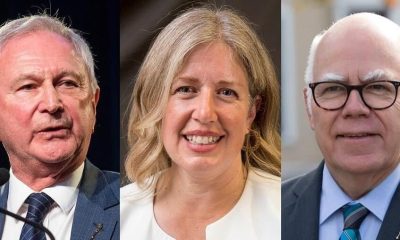MONCTON, N.B. – New Brunswick’s Liberal leader challenged her Progressive Conservative opponent on Wednesday night to explain how his plan to cut hundreds of millions of dollars in taxes will help fund a health system struggling to care for a growing population.
Susan Holt, the Liberal Opposition leader trying to deny Blaine Higgs a third term in office, said his promise to cut the harmonized sales tax by two percentage points — to 13 per cent — is irresponsible and risks pushing the province toward privatized health care.
“The premier has made the single most expensive campaign commitment of anyone on this stage … more expensive than the entire platform that a Holt government is going to put forward,” she told the leaders debate in Moncton, N.B., hosted by CBC.
When fully implemented, the tax cut will cost $450 million a year, a number Holt said will put services at risk, especially health care, at a time when tens of thousands of residents are without a family doctor — and the province’s population is growing rapidly, mostly by immigration.
And she took aim at Higgs’s claim that his tax cuts reflect the reality that “people can spend money better than government.”
Holt said, “to hear him say that New Brunswickers are better at spending their money themselves — sounds a lot to me like he thinks we’re moving into private health care.”
Higgs said Holt’s suggestion that his policies were leading to private health care is baseless — “no foundation whatsoever.”
The government, he said, is spending $1 billion more a year on health care than it was five years ago. “But there would be those who say ‘spend more money on health care and it will get better.’ And I say we need to find a way to do health care better.”
He said his government will find innovative ways to bring health services to citizens, such as expending the scope of practice of nurses and pharmacists.
Green Party Leader David Coon, meanwhile, said his party would end the centralization and privatization of the health system, promising to grant more autonomy to regional hospitals.
“We have a state of emergency in our health care system. It is Code Orange. Everyone has to get on deck. And it’s going to require a generational investment to fix our health-care system” said Coon, whose party has promised to spend $380 million a year on health care.
“That’s the money that Mr. Higgs wants to eliminate from an HST cut,” the Green leader said.
The debate marks a key milestone in the provincial election campaign, which started last Thursday and will end with a provincewide vote on Oct. 21. But there wasn’t that much actual debating Wednesday night — the format precluded leaders from challenging each other. In fact, one of the moderators said at the start of the evening, “there will be no open debate.”
Instead, viewers were offered a series of quasi speeches by leaders, peppered with retorts to each other’s statements. Among the issues they discussed were safe injection sites and changes to the province’s policy on sexual orientation and gender identity in schools.
New Brunswick has one safe injection site in Moncton, and in response to a moderator’s question about whether a Liberal government would open more, Holt said she was not aware of any applications for others. “But what we do need is real treatment for people who are struggling,” she said.
Coon said his government would “never” prohibit the use of a safe injection site, adding that substance use was a symptom of trauma.
Higgs, meanwhile, said his party will not open any new sites and will review the mission and results of the one that exists.
A highly contentious issue in the province is a requirement by the Higgs government that teachers get permission of parents before they can use the preferred names and pronouns of students under 16. Higgs said this policy respects “parents rights,” while his critics say it discriminates against trans youth.
During the debate, a moderator mentioned an anti-abortion group called the Campaign Life Coalition, which has mailed about 160,000 flyers claiming “gender ideology” was being taught in schools and that it was leading to “surgical mutilation.”
Higgs said that while he has no connection to the group, those flyers are protected by free speech. “I find it really shocking that the discussion around parents and their involvement with their minor age children is such a debate,” he said.
The Green and Liberal leaders said there is a severe shortage of teachers, who are now being accused of abusing children by activist groups. Holt said it was disappointing that Higgs refused to condemn the flyers; Coon also criticized the Tory leader for not speaking out against the “vile pamphlets.”
“Mr. Higgs seems to be quite comfortable with these pamphlets circulating,” Coon said. “He hasn’t condemned them as we have, and he should if he thinks they’re a problem. … There are big challenges in the education system, and Mr. Higgs has gone looking for problems where they don’t exist. He’s not a problem solver. He’s a problem creator.”
This report by The Canadian Press was first published Sept. 25, 2024.




























